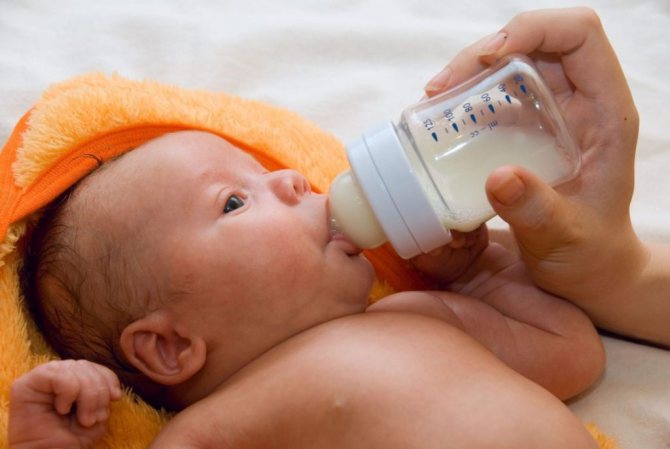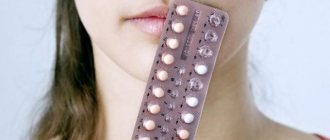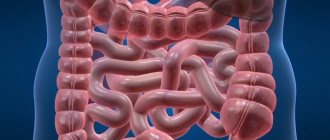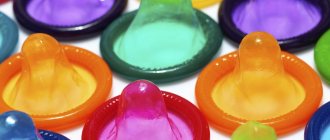Carrying a baby is a happy and hectic period for any woman. The expectant mother has many questions and concerns about her ongoing pregnancy. But no fewer questions regarding women’s health remain after the birth of the baby. Some of them: when menstruation begins after childbirth while breastfeeding, what it should be like and what to pay attention to after the menstrual cycle is restored. What is the norm, and in what cases is it necessary to consult a gynecologist?
Restoring the menstrual cycle after childbirth
As you know, during pregnancy a woman’s periods stop and do not bother her for the entire nine months of bearing the baby. The reason for the cessation of menstrual function is changes in hormonal levels, when the natural protective functions of the body are turned on and it is adjusted to preserve the fetus. After childbirth, the level of female hormones returns to normal and menstrual function is restored within 2-3 months, if the woman has not started breastfeeding. If a young mother breastfeeds her baby, her body again undergoes hormonal changes and this is associated with the production of the lactogenic hormone (prolactin). Prolactin is produced by the pituitary gland; its main function is to stimulate lactation in women after the birth of a baby. In addition to affecting milk production, prolactin suppresses the functioning of the ovaries, so women do not have menstruation during breastfeeding. The resumption of menstruation in nursing mothers occurs after the cessation of breastfeeding; the timing of the onset of “critical days” is individual for each woman.
Postpartum discharge
It is worth considering that immediately after childbirth, up to 8 weeks, a woman experiences bloody discharge with clots of mucus - lochia, which many take as the beginning of her period. In the first days after childbirth, lochia really resembles standard menstruation with heavy discharge. After a week or two, the shade of the discharge becomes duller and acquires a brownish tint, then the discharge ends. Thus, after childbirth, the uterine mucosa is restored, and the body returns to normal.
Cycle changes
For women, a delay is a reason to panic, but periods after breastfeeding will no longer be the same as before childbirth. The body has undergone internal changes, and delay may be a sign of slight hormonal imbalance. If one month they last 5 days, and the next - 3, there is no need to worry.
The cervical canal expands after childbirth, so there is no need to panic when your periods come heavier than before. At first, the body will rebuild itself, and only after 9-11 months will the cycle be restored. For some, it may recover within a year. It all depends on the characteristics of the body and how long after birth the mother breastfed the baby.
Some people worry that their periods will only come after a year. The reason for their long-term absence may be lactation - this is a natural process. There is no specific recovery period for the cycle, since everything happens individually for each woman.
Breastfeeding is very important for a child, especially at first, when he is still very weak. Do not deprive your baby of your breast, even if your period comes earlier than you expected. Nothing can be healthier for a child than breast milk.
First menstruation after childbirth: when will it start?
There is no specific answer to the question of when to expect your first period after childbirth. The timing of the first critical days after the birth of a baby is influenced by many individual factors and the woman’s health status, such as:
- Stress, nervous tension.
- Compliance with daily routine and nutrition.
- Hormone levels.
- The presence of chronic diseases and complications after childbirth.
However, the decisive factor in the arrival of menstruation during breastfeeding is the fullness and duration of lactation.
When does your period come after childbirth with breastfeeding and bottle feeding?
- If lactation is complete, without the introduction of additional complementary foods, and the baby has enough milk produced by the mother’s body, there will be no menstruation throughout the entire period of breastfeeding. An exception may be feeding a toddler after a year; in this case, the onset of critical days is quite likely.
- If the newborn is on mixed feeding and, in addition to mother's milk, milk formula is additionally introduced into complementary foods, menstruation can be expected 4-5 months after the birth of the baby. This is due to a reduced level of prolactin production and its weakened effect on ovarian function.
- With artificial feeding, the resumption of the menstrual cycle occurs after 1-2 months, in some cases later, it all depends on the characteristics of the woman’s body. The hormone prolactin is not produced in non-breastfeeding mothers and does not affect the functioning of the ovaries, which restore their function. It will take time for menstruation to stabilize.

I'm breastfeeding, my period started - why?

Most young mothers are interested in whether discharge can occur during breastfeeding, when the cause is physiological, and when it is worth worrying and urgently going to the gynecologist.
It is customary to identify the following factors due to which menstruation occurs during lactation:
- mixed feeding;
- adding fertilizer;
- reducing the number of breastfeedings;
- non-compliance with the breastfeeding regimen;
- hormonal disorders that reduce prolactin levels;
- use of medications, especially hormonal ones;
- no night breastfeeding.
If a woman follows all the rules for breastfeeding, feeds the baby exclusively with milk and doesn’t even give her water, doesn’t take medications, and still gets her period, it means that a hormonal imbalance has occurred in the body.
Menstruation while breastfeeding is not a reason to wean the baby from the breast, they can only cause a decrease in milk secretion, but in case of any doubts and concerns and to make sure that there are no pathological reasons for the start of menstruation, it is better to undergo a gynecological examination.
What are the features of menstruation after childbirth?
The first few periods after childbirth are irregular. After 2-3 months, menstruation stabilizes and returns to normal, as before pregnancy. You should not be afraid of some deviations in the abundance and duration of discharge if they differ from the prenatal period.
Possible deviations during the restoration of menstruation after childbirth
- With mixed feeding, it is normal to have scanty, short periods in the first 2-3 cycles.
- Heavy periods after childbirth in the first 2-3 cycles are also considered normal. If the intensity of the discharge does not decrease within this period, a consultation with a gynecologist is necessary.
- A violation of the cycle duration in the first months is acceptable. Normally, the duration of the menstrual cycle is 21-34 days, the volume of discharge is from 20 to 80 ml, the duration of menstruation is from 3 to 8 days.
- Menstrual pain and PMS are possible, accompanied by swelling, nausea, dizziness and emotional tension. If the pain is very severe and the woman has to take painkillers and antispasmodics, a consultation with a gynecologist is necessary. Perhaps this is algodismenorrhea - painful menstruation, which is associated with hormonal disorders in the body. Some young mothers experience the opposite situation, when the painful critical days before pregnancy become easy and do not cause discomfort or pain. The reason for the positive changes is that the uterus returns to its normal position after childbirth.

What should the color of your period be after childbirth?
- The normal color of bloody discharge is deep red. Bloody discharge has a distinct glandular odor.
- Brownish discharge is acceptable on the first day of menstruation. If the color of the discharge has a dark brown tint, is accompanied by nagging pain in the lower abdomen, and the temperature rises, this may be a sign of endometritis or cervical erosion, and this is also one of the symptoms of ectopic pregnancy.
- If the color of the discharge becomes dark yellow or has a reddish tint, this is a sign of a high content of endometrial cells and mucus in the discharge.
- Dark, almost black discharge is a deviation from the norm and indicates its accumulation in the uterine cavity. This may be a consequence of a disruption of the endocrine system, indicate the presence of polyps in the uterine cavity or a narrowing of the cervical canal.
What is this?
If your periods become very scanty, this problem is called hypomenorrhea. This quite common occurrence among young mothers indicates disruptions and deviations of the menstrual cycle. There is a possibility that complications have arisen due to diseases or an inflammatory process. To confirm your doubts or dispel them, you need to pay attention to how critical days should go normally. Few women monitor their own cycle, how menstruation proceeds, and what the nature of the discharge is.
The norm should look like this:
- nagging pain should be absent or almost non-disturbing;
- the duration should be from 3 to 7 days and decrease every day;
- the required period takes from 20 to 35 days (anything more or less is considered a deviation from the norm);
- There should be no additional bleeding between cycles;
- the volume of blood released varies between 50-150 ml;
- There should be no blood clots.
If there are deviations, it is very important for the girl to keep a calendar, mark the beginning and end of menstruation in it, note the features and keep track of how many days the interval is.
It is quite easy to notice the disease: hypomenorrhea is characterized by very scanty discharge in the form of a few drops of blood or barely noticeable traces of brown color.
There are several types of scanty discharge:
- primary - happens in a teenage girl when the cycle is just returning to normal;
- secondary - happens in an adult woman due to pathology or disruption in the functioning of the body.
Read also: Is it possible to have laser vision correction before childbirth?

It is important to monitor your health very carefully so as not to miss suspicious symptoms. You should not be happy that your periods are not the same as before and will no longer cause discomfort. It is necessary to tell your doctor about any changes or malfunctions.
Menstruation after childbirth with breastfeeding
Breastfeeding affects the absence, delay and irregularity of the menstrual cycle, as prolactin suppresses the production of estrogen. If the baby eats “on demand” and the young mother does not have periods for six months, this is the norm. When introducing the first complementary foods or additional formula feeding, a woman needs to take care of contraception, since the level of prolactin decreases and there is a possibility of conception. It is worth remembering that ovulation occurs 10-14 days before the onset of menstruation, and the egg is capable of fertilization. There are cases when a nursing mother begins to have periods and then disappears; the reason for the absence of periods is an unwanted re-pregnancy. Doctors strongly recommend preventing pregnancy during mixed breastfeeding, since the female body is not yet strong and has recovered. It will take at least 1-2 years for it to recover and be able to bear a healthy baby without complications. Menstruation after 2 births begins at the same time as after the birth of the first baby.

Menstruation after childbirth with breastfeeding: can I continue?
Restoring menstrual function is not a reason to stop feeding your baby breast milk. A young mother can safely continue breastfeeding. Often during menstruation, a woman has difficulties feeding her baby: nipple sensitivity or the baby’s refusal to latch on to the breast. To reduce discomfort and pain during feeding, it is recommended to massage the mammary gland; applying a warm compress to the nipples helps. Another important point is keeping the chest and armpit area clean. On critical days, the composition of a woman’s sweat changes and the baby can feel a change in the smell emanating from the mother.
Is it possible to breastfeed during menstruation?

When a woman begins her period while breastfeeding, this is a completely common situation, but some mothers begin to worry and wonder whether it is possible to feed breast milk during menstruation and how they affect breastfeeding. Some inexperienced mothers mistakenly believe that breastfeeding should be stopped during menstruation.
Experts say that it is necessary to feed the baby with mother's milk as long as possible, without stopping breastfeeding during menstruation. After all, this natural product helps the development of all systems of the newborn’s body and is responsible for the formation of the baby’s immunity. Only human milk contains all the necessary vitamins and microelements necessary for the full development of the baby.
A common problem that a mother faces when her period begins while breastfeeding is that her milk supply decreases. To increase its production, you can take lactation teas and put your newborn to the breast more often.
Another stereotype, because of which mothers stop feeding their babies with their milk during regular periods, is the belief that menstruation affects the taste of breast milk. So does the taste of breast milk change during your period? The taste characteristics of milk change when a woman does not pay enough attention to personal hygiene, because there are sweat glands around the areola, and if the smell of sweat and milk mixes, the baby may refuse to eat.
Experts recommend that nursing mothers wash more often during breastfeeding so that the smell of the discharge does not cause the baby to refuse to breastfeed. Also, you should not independently wean your newborn from breast milk during menstruation, since this can cause the production of prolactin to completely stop in a matter of days.
Babies who are breastfed for a long time strengthen their immunity, their body receives antibodies that can fight viruses that are in the environment. Therefore, you should not interrupt feeding during menstruation or stop it on your own initiative.
Menstruation after childbirth - when to see a doctor and sound the alarm
In some situations, bloody vaginal discharge may be a harbinger of a pathology that requires immediate medical attention.
- If postpartum lochia discharge suddenly stops, this is a bad sign, which may be the cause of endometritis or indicate a bending of the uterus. Also, the reason for the cessation of lochia is their accumulation in the uterine cavity, this complication is called lochiometer.
- If you experience scanty periods for more than three cycles, you may have hormonal imbalances or endometritis.
- If menstruation is irregular within six months after completion of breastfeeding, as well as if there is a break of 2-3 months between menstruation, this is a sign of ovarian dysfunction.
- Heavy, painful periods over several cycles may indicate accumulation of fetal tissue in the uterine cavity.
- Long, painful menstruation with nausea, weakness, and dizziness should alert a woman. In this case, it is better to undergo an examination and find out the cause of the ailment.
- Nagging pain in the lower abdomen, unpleasant color and uncharacteristic odor from the vagina during menstruation may be a sign of a tumor or the presence of an infectious disease.
- Spotting indicates a disease that is inflammatory in nature.
- Menstruation with curdled discharge, accompanied by itching – the presence of candidiasis.

How to normalize the menstrual cycle after childbirth
In order for the recovery of the female body after childbirth to proceed easily and without failures, a young mother should follow the following recommendations:
- To quickly restore the body, it is necessary to establish the correct diet and diversify your diet with plant foods: vegetables, herbs, fruits, whole grains, and drink enough water. The menu of a nursing mother should be rich in dairy and fermented milk products and meat. Don't forget about rest, daily walks and light physical activity.
- Doctors do not recommend using birth control pills as contraception after the birth of a baby, which can change hormonal levels. To protect against unwanted pregnancy, you can use barrier contraception or non-hormonal methods.
- If the baby is capricious and whiny, requiring constant attention from the mother, do not refuse the help of your relatives, who can temporarily take on some of the responsibilities of caring for the baby. Adequate rest, mommy’s good mood, her stable emotional and psychological state are the key to her quick recovery after childbirth.
- If before giving birth a woman had chronic diseases, such as diabetes, anemia, thyroid pathologies, she needs to visit a specialist after the birth of the baby to adjust the treatment.

Maintaining personal hygiene when restoring menstruation after childbirth
Maintaining personal hygiene is an important point during the recovery period of a young mother’s body after childbirth. During postpartum discharge (lochia), a woman is recommended to use pads with a smooth surface. The pads need to be changed every 3-4 hours. It is not recommended to use tampons and pads with a mesh surface during this period. When the menstrual cycle returns to normal, you can use hygienic tampons. You cannot use gels for toileting intimate places, but it is better to use baby soap.
Doctors recommend avoiding sexual intercourse, especially unprotected sex, for 6 weeks after the baby is born to prevent infection from entering the uterus.
The timing of the first period after childbirth is individual for each woman. Despite the irregularity and slight deviations from the norm in the first months, periods will eventually become regular and predictable. The main thing during this period is to listen carefully to your body, follow the doctor’s recommendations and observe the rules of personal hygiene. If your periods are painful and accompanied by prolonged and heavy bleeding for 2-3 months, immediately seek help from a gynecologist. Taking good care of your body will help you avoid many women's problems and enjoy the joy of motherhood.
https://youtu.be/Vez-Qf3t-SM
Treatment of postpartum hypomenorrhea
Hormonal therapy after childbirth
Therapy for scanty menstruation is selected based on an accurate diagnosis and the degree of development of pathological changes.
Most often, gynecologists prescribe progesterone treatment, which is designed not only to normalize the menstrual cycle after childbirth, but also to correct hormonal imbalances or existing disorders.
Restorative progesterone therapy may not be necessary at all, since a healthy woman experiences cycle disturbances no more than once a year.
If such episodes are observed more often or scanty postpartum periods are accompanied by intense release of blood clots, then doctors prescribe special therapy to the patient based on the disorders identified during diagnosis:
- For hyperprolactinemia, therapy with dopamine blockers is indicated. Sometimes surgical intervention may be required in treatment when neoplasms in the form of tumors are discovered in the pituitary gland.
- In case of heavy postpartum blood loss (Sheehan syndrome), hormone replacement therapy is prescribed, which is designed to enhance the production of the desired hormone by the pituitary gland. And the faster such treatment is applied, the faster and more effectively it will be possible to achieve a response of peripheral organs to treatment.
- Sclerocystic ovaries are accompanied by anovulation, so doctors prescribe honey to stimulate the patient. drugs. At the same time, the menstrual cycle is adjusted.
- With Asherman's syndrome (the presence of synechiae inside the uterus), the dominant causes of scanty menstruation are considered to be frequent curettage, abortion, or inflammatory processes inside the body of the uterus. It is very difficult to treat such a disorder. Doctors recommend diagnosing the pathology as quickly as possible and immediately starting cyclic hormonal treatment.
There have been attempts to transplant healthy endometrium into the patient's place, but, unfortunately, they were ineffective and unsuccessful.
A long absence of periods after childbirth and not only, severely painful or intense, sometimes with clots, or the presence of other symptoms listed above is a signal to quickly contact the antenatal clinic to diagnose dysfunction and performance of the organs responsible for women’s health. Any delay can aggravate the course of hidden diseases, despite the fact that most of them are fraught with serious consequences.
When should your period start after childbirth - in the video:
https://youtu.be/9pPGCkxzgKg
♦ Category: Women's health.











